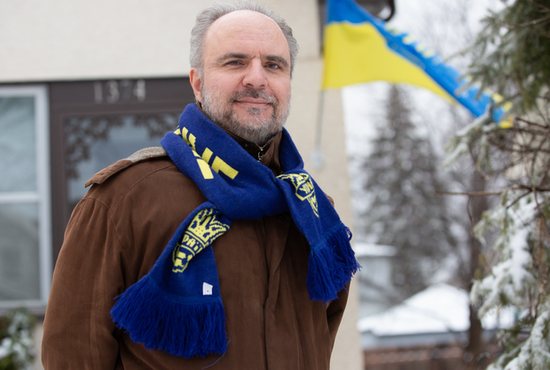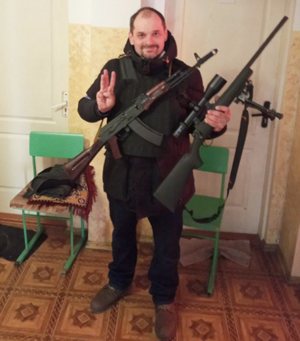
Paul Gavrilyuk gets about four hours of sleep a night.
It’s a wonder he gets any sleep at all. The Ukraine native and theology professor at the University of St. Thomas in St. Paul is working around the clock to help his native country, which he left in 1993 but has family and friends still living there.
One friend is a fellow academic who has taken up a military rifle to help defend cities and villages from fierce and relentless attacks by Russian forces who were ordered Feb. 24 to invade the country by Russian President Vladimir Putin. The two professors text often, and sometimes talk on the phone.
The news is not good.
“He just fought a battle near the Irpin River,” said Gavrilyuk, 50, who himself has military experience in Ukraine. “That is a town that was very heavily shelled. It’s about 20 miles southwest of Kyiv, the capital. And, it’s the area specifically where one American photographer died and one American journalist was wounded,” he said, referring to the March 13 Russian attack in which photojournalist Brent Renaud was shot and killed and Juan Arredondo injured.

Gavrilyuk’s friend is his age and has four children. He serves in what Gavrilyuk calls a “sniper unit” of Ukraine’s civilian defense volunteers and engaged in combat with the Russian military March 27. The man sent Gavrilyuk a five-page letter detailing the engagement, when, he said, a small Ukrainian unit with just two tanks destroyed 20 Russian tanks and held its ground.
Hearing about the conflict on a daily basis has Gavrilyuk thinking about joining the fight himself. But he came up with a better idea. It involves less risk, which makes his wife, Eugenia, happy. And, a higher reward. Much higher, he thinks.
It builds off something he started in 2015 after the Russians invaded Ukraine to annex Crimea. He created an organization called Rebuild Ukraine to raise money for much-needed supplies like tourniquets and prescription medications, then deliver them to hospitals in Ukraine.
Although he still continues to teach at St. Thomas, almost every other waking moment is spent on Rebuild Ukraine.
“I measure my life in tourniquets,” Gavrilyuk, who is Eastern Orthodox, said during an interview with The Catholic Spirit March 30. “We have the capability of sending about 5,000 tourniquets into Ukraine on a weekly basis.”
Tourniquets are medical devices used to stop the flow of blood by compressing veins and arteries, often as an emergency measure to keep a person alive. During military conflicts, tourniquets are used in the field and may be the only way to prevent fatal blood loss.
“We essentially asked ourselves the question: What product can we supply that would maximize the chances of saving a life in Ukraine?” he said. “We want to participate in God’s mission of saving lives.”
Approaching Holy Week
With Holy Week just around the corner for Catholics, Paul Gavrilyuk had no trouble connecting this liturgical season with the war in his native Ukraine against the invading Russians.
“There’s a Ukrainian Golgotha here,” the University of St. Thomas theology professor said, referring to the place where Jesus was crucified outside of Jerusalem. With heavy battles and many casualties — including civilians — it’s easy to see the parallel between the suffering of Ukrainians at the hands of the Russian army and the suffering of Christ on the cross.
Ties to the Resurrection are harder to make.
“I think it’s incredibly difficult to celebrate Holy Week because Holy Week looks forward to Christ’s resurrection,” said Gavrilyuk, who is Eastern Orthodox. “There could be no resurrection of the nation (Ukraine) until there is decisive victory (over the Russians).”
Gavrilyuk is doing his part to try to bring victory in Ukraine, by sending supplies into the country via a nonprofit he started called Rebuild Ukraine. Its logo features the letter “U” in blue, surrounding a yellow bird: a phoenix — a bird whose meaning in Greek mythology is “rising from the ashes.” But it also has meaning as “an ancient Christian symbol of the Resurrection,” he said. In the Eastern Orthodox tradition, Easter this year is celebrated April 24, one week after it is celebrated by the Catholic Church, April 17. Holy Week in the Orthodox church is called Passion Week.
“I can live through Passion Week, to be sure,” Gavrilyuk said. “But the Easter part, I think, for me, is in the future. The Easter part will have to be postponed until the end of the war.”
As soon as the Russians invaded Ukraine in February, Gavrilyuk’s organization ramped up to raise money and deliver tourniquets and other supplies in anticipation of the heavy military conflict that ensued. So far, Rebuild Ukraine has brought 2,500 tourniquets into the country, and Gavrilyuk hopes the efforts will not only continue, but increase.
“The hope is to send 10,000 more in the next month,” he said. “We’re really talking about easily 1,000 wounded (Ukrainians) a day. So, that means if I had 7,000 tourniquets to pump into the country every week, I’d be a very happy man.”
One thing that distinguishes his organization from other relief efforts and helps it be more effective is having volunteers who live in Ukraine. He has 100 volunteers working in two major cities — one of them Kyiv — to distribute the donated supplies to hospitals and all the way up to the front lines of battle. He has about 15 volunteers in the U.S.; some of them are in the Twin Cities. One of them hosted a fundraiser in Stillwater March 9 that infused the organization with money to expand its efforts.
Soon, another important item will be added to the list of supplies collected and sent by Rebuild Ukraine — bulletproof vests. Gavrilyuk is working on manufacturing vests to deliver to civilian defenders, and said he hopes to have vests ready to ship overseas within two weeks. Another source is police departments that have “decommissioned” bulletproof vests because of age. Gavrilyuk recently became aware of this phenomenon and began reaching out. The response has been encouraging.
“I want to thank police chiefs, specifically in Wisconsin and in Texas,” he said. “What I wrote was a crazy request: Could you supply decommissioned police vests to Ukraine? They immediately said, ‘Absolutely, yes. It would be an honor, actually, to do it.’”
Gavrilyuk has also started to shift some of his attention to food. After careful thought about the best food item to make and distribute, he came up with beef jerky. He said beef is plentiful in Ukraine and the surrounding countries, and jerky is highly nutritious and easily transportable. Already, volunteers are hard at work making and distributing it to civilians and soldiers alike in Ukraine.
He highlighted the efforts of one person in particular — a woman who lives in Ukraine but is removed from the current military battle areas.
This volunteer “is drying meat in her house (and) also sheltering 20 refugees,” he said. “And, her young husband, 25, is fighting (against the Russians). So, the husband is fighting, the wife is taking care of 20 refugees and producing more than a hundred pounds a week of dried meat for us.”
The only part of his Rebuild Ukraine effort causing uncertainty is fundraising. He is working hard to solicit donations by traveling to other cities like Chicago and New York, and by creating a website, rebuild-ua.org. But, raising money is not his area of expertise, he readily admits.
“I’m just a 50-year-old trying to do fundraising,” he said. “As a university professor, I need a lot of help. I’ve never done it (before).”
At the local level, he has had discussions with administrators at St. Thomas about having a panel discussion and a photo exhibit of war images from Ukraine, which will take place April 11 at the university, and he is working to gain support from other local leaders.
For now, he will continue to follow his passion and work tirelessly to support the efforts of Ukrainians to defend their country.
“I would love to have 240 hours in a day and not 24, but that’s as much as the Lord gives,” he said. He wants to stand up against what he calls “serious war crimes,” which likely won’t end until there is a “regime change” in Russia.
“There is no end game to what Putin is doing,” he said. “Ukrainians are paying with the lives of civilians and the lives of its military and voluntary defense units. And, that’s horrible. That’s a very high price. And, I think it’s important that the world doesn’t just admire Ukrainian bravery, but also supports it with prayer and compassionate action. And, compassionate action is what Rebuild Ukraine is about.”
Russian roots
Paul Gavrilyuk was born in Ukraine, and his wife, Eugenia, in Russia.
Does that make for high tension due to the Russian invasion of Ukraine Feb. 24?
Not at all. Both feel exactly the same way about the attempt by Russian President Vladimir Putin to take over Ukraine.
“When all these disasters started to happen, not only me, (but) all my Russian friends born in Russia who identify themselves as Russian, we experienced the same, almost physical sense of nausea and disgust,” said Eugenia, 57, a Moscow native who, like her husband, teaches in the theology department at the University of St. Thomas. “It’s noxious, as if you are poisoned. It’s a sense of deep shame.”
Paul feels the same way, which is why he started the nonprofit Rebuild Ukraine to send supplies to war-torn cities in Ukraine. It is primarily his venture, but he has Eugenia’s full support.
The war in Ukraine “is very difficult for me,” Paul, 50, said. “My elderly parents are now refugees. My great aunt, who is 98 … is a refugee (now living) in Lithuania.”
Paul grew up in Kyiv, the capital of Ukraine. At that time, Ukraine was part of the Soviet Union, but the country gained its independence in 1991 with the collapse of Communism and the breakup of the Soviet Union.
Prior to that, Paul had served in the military for almost three years as a citizen of the Soviet Union. He then enrolled at the Moscow Institute of Physics and Technology, where he met Eugenia. Both earned undergraduate degrees in physics, then married in the town of Novgorod near Moscow in 1993. A year before that, Eugenia, who had no religious affiliation growing up, was baptized a Roman Catholic in Moscow. Now, she and Paul are Eastern Orthodox, the faith of Paul’s upbringing.
Although there has been much movement of people back and forth between Ukraine and Russia, there is a distinct Ukrainian culture that its citizens, including Paul, are trying hard to preserve. Thus, they are defending more than just buildings, but a way of life and, even, a religion.
“Ukraine is home to the largest body of Eastern-rite Catholics anywhere in the world,” Paul said. “We’re close to 5 million Eastern-rite Catholics in Ukraine, and most of them are concentrated in western Ukraine.”
For him, the assessment of the Russian invasion is simple.
“They’re bombing civilians,” he said. “These are war serious war crimes. … It’s callous and it’s a genocide of the whole culture.”
He added, “You basically have the second-largest army on Earth and the country with the largest land mass on Earth still wanting to grab yet another piece of territory that doesn’t belong to it.”
These sentiments are being shared with students in their classes at St. Thomas. That is where Eugenia says she can make a difference.
“I’m teaching a full load, and I use this opportunity to inform my students about what is going on,” she said. “Almost in each class, I make some parallels — sometimes, not intentionally — because it’s always in my head what’s going on between Russia and Ukraine. And, when you are teaching the Bible, you can see lots of parallels.”



